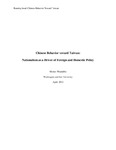Chinese Behavior Toward Taiwan: Nationalism as Driver of Foreign and Domestic Policy (thesis)

View/
Author
Wendelbo, Morten
Subject
Washington and Lee University -- Honors in Politics
Zhongguo guo min dang
Zhongguo gong chan dang
History
Chinese -- Politics and government
Twentieth century
Metadata
Show full item recordDescription
Thesis; [FULL-TEXT FREELY AVAILABLE ONLINE] Morten Wendelbo is a member of the Class of 2012 of Washington and Lee University. When the Chinese Nationalists [KMT] retreated to Taiwan in 1949 to establish a government in exile, an obvious hostility emerged between the nationalists and the communists [CCP] who had evicted them from the mainland. Ruling from Taipei in Taiwan, the KMT retained de jure leadership over mainland China as far as most other countries were concerned. De facto, however, the KMT could assert little influence on the mainland where the communist party quickly began establishing its own institutions. Because the KMT occupied the island, Taiwan went from being a region with little interest to either party to being central to Chinese politics almost overnight. The two Chinas have yet to resolve this conflict, which has largely remained the same over the years. Yet, much has changed since the KMT threatened the CCP's newly established rule in the 1950s; the KMT is no longer a credible threat to communist power. What then, if not the security threat posed by the KMT, has driven the centrality of Taiwan to Chinese politics? That is the question this paper attempts to answer here. [From the Introduction]